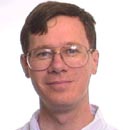NERSC Users Showered With Accolades
April 29, 2011
April brought in a shower of accolades to longtime NERSC users as chemist Martin Head-Gordon was elected to the American Academy of Arts and Sciences, Darleane Hoffman was honored with the Glenn T. Seaborg Actinide Separations Award and Phillip Geissler was honored with UC Berkeley Distinguished Teaching award. Meanwhile, Martin White was the only physics recipient of the 2011 Guggenheim fellowship. to "mine" BOSS data.
Martin White Awarded Guggenheim Fellowship

Martin White
Martin White of the Physics Division has been granted a 2011 Fellowship by the John Simon Guggenheim Memorial Foundation, the only physics recipient among this year's 180 fellows. White, who heads the Survey Science Team for the Baryon Oscillation Spectroscopic Survey (BOSS) based at Berkeley Lab, received his fellowship to "mine" BOSS data. He'll optimize the methods BOSS uses to determine the expansion history of the universe and tackle questions including the nature of luminous red galaxies, which he calls "problematic for years," using the spectra of the 1.5 million such galaxies BOSS is collecting. Guggenheim fellowships vary but average tens of thousands of dollars to support scientific, scholarly, and creative work for six months to a year. White is the principal investigator of a project called "Constraining dark energy with structure formation," which has used 532,765 processor hours at NERSC this year.
»More

Phillip Geissler
Phillip Geissler Honored with Distinguished Teaching Award
NERSC user Phillip Geissler, who is also an associate professor of chemistry at the University of California, Berkeley, has been honored with the campus’s 2011 Distinguished Teaching Award. Thsi award is UC Berkeley's top honor for exceptional teaching. Geissler is “passionate, inspiring,” wrote one student. “I speak without exaggeration when I say that taking his classes and having him as a teacher, a mentor and a friend was one the biggest factors that made my Berkeley experience special.”
»More
A longtime NERSC user Martin Head-Gordon of the Berkeley Lab's Chemical Sciences Division, a theoretical chemist who specializes in the development of novel theories and algorithms that explain electronic structure, has been elected into the class of 2011 of the American Academy of Arts and Sciences. Founded in 1780, the Academy is an independent policy research center that conducts multidisciplinary studies of complex and emerging problems. Elected members are leaders in the academic disciplines, the arts, business, and public affairs. Head-Gordon joins a 212-member class that includes legendary jazz pianist and composer Dave Brubeck, acclaimed documentary producer Kenneth Burns, and Oscar-winning actor Daniel Day Lewis.
»More
Longtime NERSC user Darleane Hoffman of the Berkeley Lab's Nuclear Science Division has added the 2011 Glenn T. Seaborg Actinide Separations Award to her long list of honors in nuclear chemistry. Actinides, the 15 chemical elements between actinium and lawrencium, most famously include uranium and plutonium. Established in 1984 by the annual Actinide Separations Conference, principal gathering of the nation's actinide chemists and engineers, the first Seaborg Award was present to plutonium discoverer Seaborg himself. Hoffman is the second Berkeley Lab winner since Seaborg and the first woman in the award's history. She will receive the award, consisting of a plaque and honorarium, May 26 at the 35th Annual Actinide Separations Conference in Charlotte, North Carolina.
About NERSC and Berkeley Lab
The National Energy Research Scientific Computing Center (NERSC) is a U.S. Department of Energy Office of Science User Facility that serves as the primary high performance computing center for scientific research sponsored by the Office of Science. Located at Lawrence Berkeley National Laboratory, NERSC serves almost 10,000 scientists at national laboratories and universities researching a wide range of problems in climate, fusion energy, materials science, physics, chemistry, computational biology, and other disciplines. Berkeley Lab is a DOE national laboratory located in Berkeley, California. It conducts unclassified scientific research and is managed by the University of California for the U.S. Department of Energy. »Learn more about computing sciences at Berkeley Lab.







